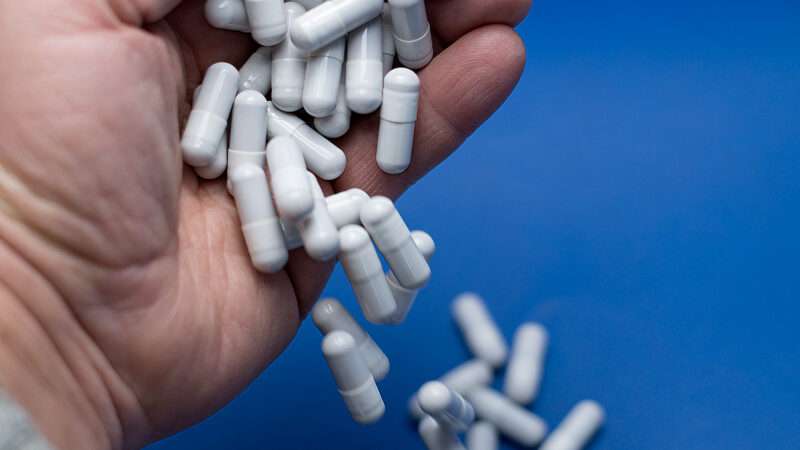
The government has charged two medical executives for allegedly overprescribing prescription stimulants. Unfortunately, there's no sign that any government officials will ever face repercussions for making those same medications harder for people to get in the first place.
On Thursday, the Department of Justice announced that it had arrested two executives at the telehealth company Done Global on several charges, including conspiracy to commit health care fraud and obstruction of justice.
Ruthia He, Done's founder and CEO, and David Brody, the company's clinical president, are alleged to have "exploited the COVID-19 pandemic to develop and carry out a $100 million scheme to defraud taxpayers and provide easy access to Adderall and other stimulants for no legitimate medical purpose," according to U.S. Attorney General Merrick Garland. Adderall is the name-brand prescription stimulant most often used to treat attention-deficit/hyperactivity disorder (ADHD), as well as other conditions, such as narcolepsy.
In March 2020, at the outset of the COVID-19 pandemic, the Drug Enforcement Administration (DEA) announced that doctors and nurse practitioners could now issue prescriptions for controlled substances via telehealth, relaxing a provision in a 2008 law requiring at least one in-person evaluation first.
He, a former Facebook product designer, founded Done in December 2019, just weeks before COVID-19 reached America's shores. Done raised money from such investors as venture capitalist David Sacks and former NFL quarterback Joe Montana.
In its indictment, the government alleges that company officials "exploited emergency flexibilities during the public health emergency to provide easy access to Adderall and other stimulants that were not for a legitimate medical purpose in the usual course of professional practice." The company found many of its patients through ads on social media.
Prosecutors claim that under the company's policies, patient assessments were limited to 30 minutes and practitioners were expected to issue stimulant prescriptions "even if the Done member did not qualify." (In fact, Done touts the 30-minute initial appointment on its website.) The filing states that Done did not require followup appointments and even refused to reimburse providers for any appointments after an initial consultation—an action undertaken, as He allegedly wrote, to "dis-encourage follow-up."
The indictment charges that Done also created fake documents, including patient records and prior authorizations, to submit "false and fraudulent claims" to pharmacies, as well as to Medicare, Medicaid, and private insurers, which "paid in excess of approximately $14 million."
Much of this should be unsurprising: In March 2022, the New York Post covered the proliferation of telehealth firms' social media ads hawking stimulants, which doctors found concerning. That same month, The Wall Street Journal reported that telehealth startups like Done "applied pressure on clinicians to prescribe stimulants, and some [employees] said the companies' initial 30-minute video evaluations often weren't sufficient to diagnose ADHD." In May 2022, Walmart and CVS both announced that they would no longer fill controlled-substance prescriptions from Done. By September 2022, news outlets were reporting that the DEA was investigating Done for potential violations of the Controlled Substances Act.
To substantiate charges of obstruction of justice, the indictment alleges that as public opinion shifted against the company, executives like He and Brody set about "corruptly altering, destroying, and concealing records and documents," including after they received a grand jury subpoena.
The government alleges that Done prescribed 40 million pills and generated $100 million in revenue since the start of the pandemic. Ironically, much of this alleged overprescribing took place as the U.S. experienced a severe Adderall shortage—for which government officials still refuse to accept any responsibility.
As Reason has documented very extensively, the Food and Drug Administration first declared an Adderall shortage in October 2022. Parents stuck at home with their children struggling to pay attention to school over Zoom, along with relaxed rules on telehealth prescriptions, caused ADHD diagnoses to skyrocket.
But the federal government sets annual production caps on controlled substances—including the amphetamines that make up the active ingredients in prescription stimulants like Adderall. And since the start of the Adderall shortage, the government has declined to raise the quotas, keeping the cap in place even as the demand for the drug has gone through the roof.
The DEA noted in its 2023 report that while it was "aware of patient reports that pharmacies are unable to fill prescriptions for their prescribed Adderall or one of its generic versions," it nonetheless "has not implemented an increase to the [quota] for amphetamine at this time." In its report for 2024, the agency "determined" that the existing quotas "are sufficient to supply legitimate medical needs, reserve stocks, and export requirements for 2024."
If the prosecutors' claims are true, Done Global very likely engaged in fraudulent and criminally negligent behavior in order to maximize profits at the expense of its patients—at least one of whom died, allegedly as a result of the company's lax policies.
But for ADHD patients who genuinely depend on medicines like Adderall, the government's actions produced a shortage keeping countless people from accessing a medication that allows them to function better. While Ruthia He and David Brody will be faced with the consequences of their actions, it's unlikely that any government official will ever face the same.
The post Feds Arrest Telehealth Execs for Overprescribing Adderall appeared first on Reason.com.







